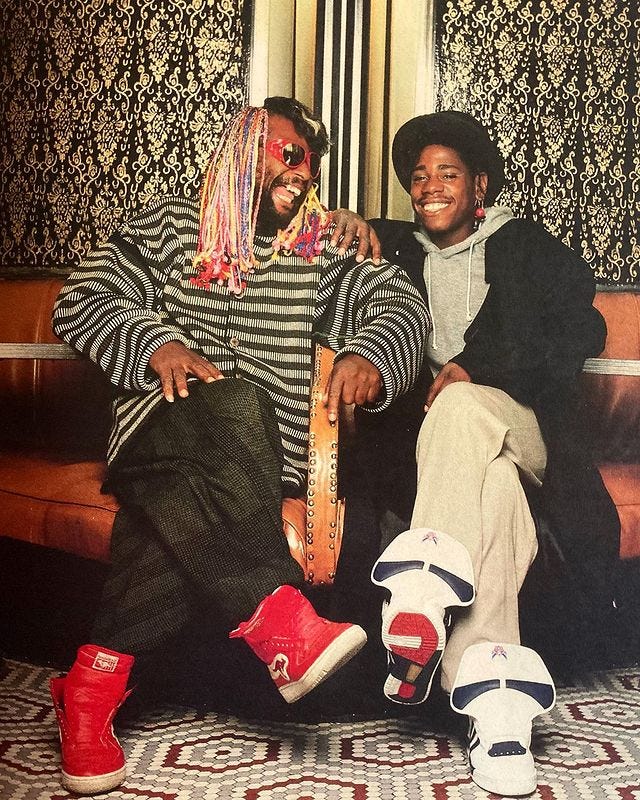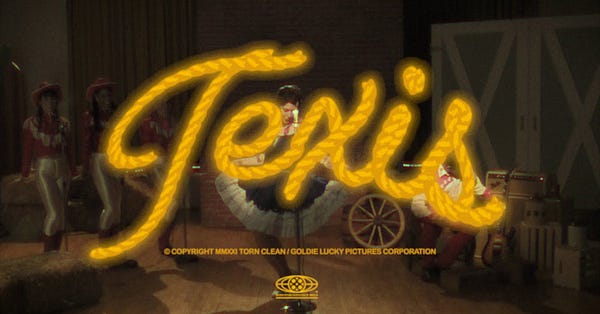Fluxblog #328: Aerosmith • Michael McDonald • Sleater-Kinney • Stone Temple Pilots
Also a new playlist that's basically an imaginary 90 minute mix tape from 1989
This week’s playlist is FULLY CLOTHED LATE ‘80s BEACH BABES, an imaginary 90 minute mix tape inspired by this image from a 1989 magazine advertisement for L.A. Gear. I like to think of it as a tape they’re playing in their car, and maybe it was made for one of them, or maybe one of them made it herself. It’s all rock and pop bops from 1988 and 1989 and it’s perfect for cruising and/or crushing, 100% summer fun vibes. [Spotify | Apple Music]
This week’s episode of Fluxpod features the photographer Laura June Kirsch, whose forthcoming book Romantic Lowlife Fantasies collects a body of work in which she documented DIY music scenes, musical subcultures, and music festivals from 2008-2016. We talk about her background in photographer, her approach to environmental portraiture, and how photography has changed from her time in art school through the age of Instagram. You can find it on all the podcast platforms and the Fluxblog Patreon.
Also! If you have no interest in subscribing to the Fluxblog Patreon but would like to do a one-time donation – and to be really honest with you, it would help me a lot these days! – you can donate via the Fluxblog Ko-Fi page.
This week’s Fluxblog posts are all about old songs! I needed a break from churning through the new stuff.
July 26th, 2021 3:28pm
The Toss Of The Dice
Aerosmith “What It Takes”
Steven Tyler doesn’t ever come across like a loser in his songs, even when he’s singing from the position of a guy who’s been dumped and can’t figure out how to move on in “What It Takes.” He’s always the cool guy, the sexed-up fun guy, the guy who’s rough around the edges but always has a high status. He’s a rock star and he’s always got a party, and he’s always inviting you to come along. His problem in “What It Takes” is not so much that he’s been dumped but that this happens so rarely to him that he doesn’t even know how to process it. He’s so used to being on the other end of the dynamic that not getting what he wants is somewhat alien to him. This could be kinda gross, but it’s not – the arrangement is rooted in blues but it’s played in a bright major key, and while Tyler sings with feeling he’s also giving us his usual razzle dazzle, so it’s more hammy and theatrical than genuinely melancholy. It’s more like he’s indulging in the idea of sadness than spiraling into actual despair. Maybe it’s supposed to be that thing of “let’s acknowledge this feeling, honor it, and move on.”
“What It Takes” is from Pump, the hugely popular follow-up to Aerosmith’s comeback album Permanent Vacation. That record re-established the band as hitmakers with the help of outside songwriters Jim Vallance and Desmond Child and while the soppy power ballad “Angel” has a touch of desperation to it, the band mostly just sounded like a brighter version of themselves with major late ‘80s studio gloss. Aerosmith fit in well with the hair metal party rockers of that era but the music was more complementary than similar, and the songs on Pump in particular have a high degree of ambition and sophistication that it’s easy to forget when the most memorable bits are just big dumb rock n’ roll. “What It Takes” is exceedingly warm and rich, a gloriously decorated dessert of a song that would have quite good but far less remarkable with a more standard rock arrangement, and possibly very bad with a more maudlin and earnest power ballad arrangement.
“Love In An Elevator” is a good example of studio excess of Pump working in Aerosmith’s favor. It’s a swaggering rock song about fucking on the job that starts with the line “workin’ like a dog for the boss man” and even attempts a winking double entendre on the word “fax.” It’s a song with some sledgehammer hooks, a dirty riff, and a Penthouse Letters lyrical conceit, and you really could just stop right there and you’d probably have a hit. But they just keep upping the ante, piling on harmonies and pushing the song higher until you get to the point where they basically decide to turn this horny himbo anthem into their “A Day In the Life.” It’s musically satisfying but also totally absurd, it makes the joke of the song funnier but also presents Tyler as someone who is horny on like, a cosmic or mythological level. I don’t know if anyone can relate to this or even if it’s necessarily aspirational, it’s more like listening to this is communing with some kind of raunchy godhead.
Buy it from Amazon.
The Light Of Tomorrow Is Right Where We Are
Michael McDonald “Sweet Freedom”
“Sweet Freedom” requires a contemporary listener to surrender to the extreme ‘80s-ness of it all. Even relative to the most egregiously corny ‘80s pop this song is a bit extra with its relentlessly perky funk and a recording style so precise and heavily synthesized that the percussion, bass, and keyboard tones all sound rather uncanny. The song was composed by English songwriter Rod Temperton – if you don’t know his name you’ve certainly heard his music as he’s the sole writer of the Michael Jackson classics “Rock with You” and “Thriller” among other late ’70s to mid ‘80s post-disco hits – and everything about the track is basically the Temperton aesthetic pushed to an auteurist extreme.
“Sweet Freedom” is basically a crew of studio ringers executing Temperton’s musical ideas, unfettered by the creative whims of a client artist. The track is dense with intersecting rhythms and melodies without feeling too heavy, and Temperton is so effective at directing your attention to the lead melodies that more the more rhythmic keyboard elements like the galloping chords on the chorus can feel relatively subtle in the mix. The song wasn’t written specifically for Michael McDonald but it’s hard to imagine it being better with anyone else at the center as he matches the track’s odd blend of primary color boldness and easy-going breeziness. Who else can seem to bellow like a grizzly bear but make it feel like a whisper?
Temperton was such a genius of funk and composition that his lyrics can seem purely functional, accessible and inoffensive phrases that simply carry the melody. But as I’ve obsessively listened to “Sweet Freedom” over and over in the recent past I’ve inevitably paid more attention to what McDonald is actually singing and I can’t help but imagine it as the ramblings of a very earnest guy who has just done enough cocaine to feel like he’s grooving on some deeper truths and clicking into some new, vague ambition. The whole song exists in the moment of epiphany – inspirational and aspirational, but also irrational. It’s a moment of intense self-belief and optimism extended, amplified, and frozen in time. McDonald sings “there’s no turning back from what I’m feeling,” and while he very well might come down from that feeling within an hour, he sings it like there’s no chance he could be wrong.
Buy it from Amazon.
Counterfeit Or Real
Sleater-Kinney “Hot Rock”
“It’s not real. You don’t need to tell me that it’s not real.”
That’s the part of Sleater-Kinney’s “Hot Rock” I have played over and over, because that’s the part that hurts for me to hear. I can remember the first time I related to that line, and rewinding and playing it again and again on a Metro North train when I was 19 years old. If only it was just connected to that one moment in time. This lyric has been a refrain through my life – for unrequited loves, for deluding myself into believing bad relationship dynamics were in fact healthy and good, for thinking that anything for me could ever be happy and reciprocal – that it can feel like I’m just replaying the same small part of a three minute song on repeat. Like I’m just doing it to hurt myself.
This is what people do with Sleater-Kinney records. It’s not always about the same things or about the same songs, but listening to this band is all about willfully confronting your most painful and angriest feelings and hoping that by facing them head-on you will become a stronger person. They always sound brave, and they make the stakes of even their small handful of silly songs seem ridiculously high. Sleater-Kinney are never holding your hand or nudging you to jump into the fire. You leap in of your own accord because they already have, and they make it look like the only path to catharsis. You do it because they seem better for having done it themselves.
The most distinctive aspect of Sleater-Kinney’s sound is the contrast of Corin Tucker and Carrie Brownstein’s voices. This was a very deliberate thing, particularly on their breakthrough albums Dig Me Out and The Hot Rock. Brownstein’s voice is cold and aloof, and her lyrics tend to be analytical in tone. Tucker’s voice is the polar opposite. Her voice is hot, loud, and intense. Her lyrics are direct and emotionally raw. She sings with such force that her most fierce wails sound as though they could blast a hole through a mountain range. They play off each other like overlapping thoughts in the same brain, with Tucker serving as the id and Brownstein playing the superego. They dramatize the messy, confusing feelings of a conflicted mind.
If you come to Sleater-Kinney’s music to jump into the fire, you quickly learn to distrust everything Brownstein sings. She’s the neurotic voice that convinces you to back away from your feelings and avoid taking risks. She’s the one who is being reasonable, which in this context is basically a synonym for repressed or cowardly. In “Hot Rock,” Brownstein turns the plot of Peter Yates’ 1972 heist film The Hot Rock into an extended metaphor for trying to steal someone’s heart. In her half of the song, relationships are seen in terms of property, and a crafty person can make someone fall in love with them. Tucker’s lyrics are a brutal counterpoint. She knows the horrible truth: “I’m not the one you wanted, not the thing you keep.” Even for the hyper-emotive Tucker, she sounds ragged and vulnerable here. Brownstein’s schemes and bravado are entirely neutralized by her nagging doubts. It’s hopeless. It’s not real.
I brace myself for the climax of “Hot Rock” every time. There’s a brief instrumental section heralding the part, and in those moments you can prepare yourself for the arrival of the bitter truth. The agonizing part of this is not in finding out that it’s not real, but in that you already knew that all along. The pain is in having to let go of the tiny bit of hope you had that your doubts were wrong, and that you had for once actually found the love you wanted. It’s a disappointment, but mostly in yourself for being fool enough to believe that anyone could want you. You’re not the one they wanted. You’re not the thing to keep. Don’t you get it by now?
At the end of the song, Brownstein rationalizes Tucker’s emotional revelation. She sees the truth of the situation, and with more clarity than the heartbroken Tucker. She knows what she has to do and makes a vow: “I’m going to steal my heart back and find a love that’s true.” This is where you need to trust Brownstein’s voice of reason. It’s not a happy ending, but it is an attempt to salvage some pride and self-respect from this mess. Who knows, you might be better off for having gone through this.
Buy it from Bandcamp.
Like It’s The Last Hello
Stone Temple Pilots “And So I Know”
Even in the context of Tiny Music…Songs From the Vatican Gift Shop, an album in which the Stone Temple Pilots used the leverage of the major success of their first two albums to indulge their muses, “And So I Know” is a major outlier. It’s a gentle lounge ballad built upon guitars that sound like sunlight shimmering on swimming pool water with everything else in the mix seeming to float around aimlessly like inflatable pool furniture. Scott Weiland sings a lot of cryptically fatalistic lyrics but sounds totally at peace here, emphasizing the prettiest and most elegant parts of his voice and embracing lounge singer irony just enough so that his performance comes through as a charming wink rather than a smarmy grin. (Even with the creepy “campfire girls make me feel alright” refrain!)
The most remarkable thing about “And So I Know” is the low-key but highly expressive lead guitar part that comes in over the middle eight. I’m not sure whether this is Dean or Robert DeLeo playing – I suspect it’s the former, though Robert is the primary author of the song and also plays bass, vibraphone, and electric harpsichord on the track. It’s a gorgeous solo based in the main melodic themes of the piece while elaborating on the emotion conveyed in Weiland’s vocal. It feels as though the song itself is giving up on trying to convey its feeling through his words, like it’s recognizing the limitations of phrases like “never ever be this way again” and just pushing you to ~feel~ this reluctant but gracious acceptance of loss and futility.
Buy it from Amazon.



LINKS LINKS LINKS LINKS LINKS LINKS LINKS LINKS
• Here’s Craig Jenkins with a very good critique of the absolutely horrendous HBO documentary about Woodstock ‘99. He’s a lot more gentle with this than I would be.
• Shallow Rewards has a great new audio essay about The Cure’s 1992 album Wish – it’s sharply critical of a lot of the creative decisions made by Robert Smith on the record, but also very good at articulating what’s so compelling about its best songs like “End,” “From the Edge of the Deep Green Sea,” and “Friday I’m In Love.”
• Marc Maron did a great interview with Lindsey Buckingham that ends on the point that he is still technically in Fleetwood Mac, that “the divorce hasn’t been finalized” and the door is open for him to return.









